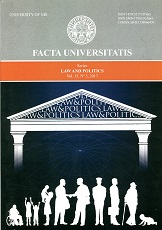Parliamentary Democracy in India: Legal Issues and Challenges
Parliamentary Democracy in India: Legal Issues and Challenges
Author(s): Geetika SoodSubject(s): Constitutional Law, Government/Political systems, Politics and law
Published by: Универзитет у Нишу
Keywords: parliamentary democracy; democratic institutions; constitutional powers; India; judicial practice (case law); problems and challenges
Summary/Abstract: In this paper, we examine the parliamentary democracy in India. The Constitution makers adopted the British model of parliamentary democracy but democratic institutions had existed in many parts of ancient Vedic India. In this historical context, we explore the concepts of ‘Sabha’ and ‘Samiti’, the ancient institutions of representative democracy in India. Under the Constitution, the people of India exercise their sovereignty through Parliament at the central level and through State Legislatures in each State. The executive power is vested in the President, who is the highest dignitary in the realm, the symbol of the statehood, and the embodiment of the unity of the country. He represents the sovereign will of the nation and exercises his functions by acting on the advice and aid of the Council of Ministers. Different cases have been discussed regarding the judicial approach to parliamentary democracy, the concept of independence of the judiciary, and its power to amend the Constitution. After discussing the the parliamentary privileges and freedom of speech in Parliament, the author casts more light on the concepts of election and adult suffrage in India, and focuses on the role and position of the Speaker/Chairman in the House of People and respective State Legislatures. In the end, the author identifies specific problems observed in practice and discusses the challenges facing the Indian parliamentary democracy.
Journal: FACTA UNIVERSITATIS - Law and Politics
- Issue Year: 15/2017
- Issue No: 1
- Page Range: 95-109
- Page Count: 15
- Language: English

